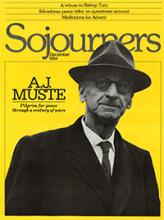A.J. Muste first delivered this Christmas sermon in 1951 at the First Unitarian Church of Schenectady, New York. It was later published in the December 1976 issue of Fellowship magazine by the Fellowship of Reconciliation, Nyack, New York.—The Editors
Read the Full Article

Already a subscriber? Login
